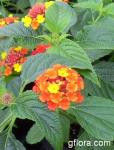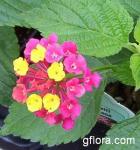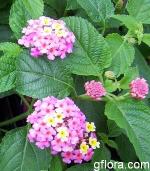|
|
LantanaFamily: Verbenaceae.
|
Common name(s): Shrub verbena |
|
 |
Genus of about 150 species of evergreen shrubs and perennials from tropical North, Central, and South America, and South Africa. In areas where it is adapted it can become a weed. In northern areas, the plant is used as an annual bedding plant or a pot plant. Lantana tolerates dry soils and should be grown in full sun. Size range from 2-4' for the upright species, 12-24" for trailing lantana. Small, rounded clusters of flowers in bright solids or multi-colors. Useful in beds, borders, hanging baskets, containers, etc. Tolerance for heat, wind, drought, and salt makes lantana a good choice for coastal gardens.
Lantana camara is the only species grown indoors. It is usually kept trimmed to 1-2 ft. The flowering season lasts from spring to late summer.
Blackish-purple berry is poisonous. |
 |
| Growing conditions |
Watering and misting |
Propagation |
| Average warmth in summer - minimum 60 F in winter.Brightly lit spot or full sun. Grow in soil-based potting mix. |
Keep compost moist at all times. Do not allow to dry out but do not over water. Reduce watering in winter. Use soft, tepid water. Misting is necessary. |
Take semi-ripe stem cuttings in spring or summer. Use a rooting hormone and provide bottom heat. Sow seed at 61-64 F (16-18 C) in spring. |
|
Lantana camara |
|
|
Variable shruns with ovate, finely wrinkled, strongly scented, deep green leaves, 2-4in (5-10 cm) long. Flowerheads 1-2in (2.5-5 cm) across in colors ranging from white to yellow and pink to red or purple, often in combinations, are borne from from late spring to late autumn.
The picture: Lantana camara "Feston Rose" |
 |
|
These materials are freely provided for instructional and educational purposes. Any duplication or publication of text or images herein for commercial gain without explicit written permission of the owner or photographer constitutes breach of trust and violation of copyright.
Copyright © Galka Okhapkina 1998-2026



